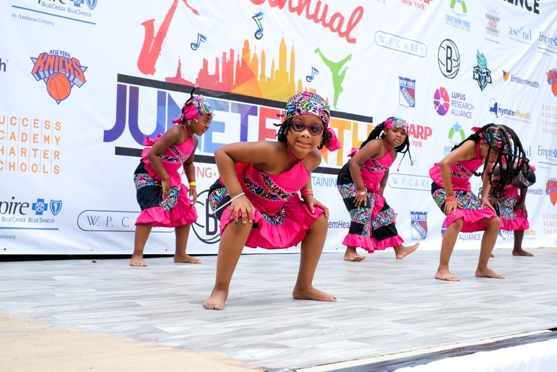Juneteenth: America’s newest holiday, 156 years in the making
By The New York Times and Aidan Gardiner
Standing at the site in Galveston, Texas, where on June 19, 1865, a Union general signed an order notifying enslaved African Americans that they were free, artist Reginald C. Adams marvelled at the moment he found himself in.
What would a Black man of that era think about seeing him, another Black man, painting a massive mural commemorating emancipation, he wondered.
“I realized, ‘Reginald, you are your ancestors’ wildest imagination,” Adams said.
Using 320 gallons of paint over two months, Adams and his team created the 5,000-square-foot mural that was formally dedicated Saturday (19) during nationwide commemorations of the event that came to be known as Juneteenth. Times photographers captured scenes from these events around the country.
The celebration of emancipation of Black Americans has long been a regional holiday observed mainly in Texas, which was the first state to formally recognize it in 1980, but it gained wider recognition last summer amid a national reckoning over killings by the police and persistent racial inequities in America. Major corporations and several states adopted Juneteenth as a paid holiday, and Thursday (17) it took on new significance when President Joe Biden signed legislation designating it a federal holiday.
“Now Juneteenth is on the mass consciousness of America,” Adams said.
The most recent federal holiday to be recognized was Martin Luther King Jr. Day, in 1983, and nearly two decades passed before it was celebrated in all 50 states. Of the now 11 federal holidays, the only other adopted after 1950 was Memorial Day.
But as holidays gain wider recognition, they can become divorced from their original meaning, as they become tied to retail sales or generic festivities. Joy Bivins, who starts as the director of the Schomburg Centre for Research in Black Culture on Monday, said she hopes that Juneteenth avoids that fate.
“I think holidays like MLK Day and Juneteenth, they kind of require a little bit more,” she said. “I would hope that rather than shop, people would maybe read or learn something or wrestle with the complexity of holidays like that .”
Bivins welcomed the designation of Juneteenth as a federal holiday but noted that an array of societal problems still challenge the freedom of Black Americans.
“We are still dealing with the remnants of this long shadow of the system of enslavement,” she said. “What are the other ways that we can ensure that we are celebrating a continued expansion of freedom for people?”
Maurice Cook, executive director of Serve Your City, a nonprofit that supports minority students, said he was pleased the holiday had gained prominence but noted that it did little to address the underlying problems of racism and economic inequality.
“Juneteenth is more about a global justice that we’re still waiting for,” he said as he sat listening to the celebrations taking place in the Washington, DC, neighbourhood of Anacostia. “We lose people on a daily basis.”
Cook, 50, grew up in Maryland celebrating the holiday with family, “loving each other, being together.”
“We have to celebrate that we survived,” he said.
Others balked at the government’s move to recognize the holiday. Imani Fox, who was at the same Washington event as Cook, said it was an empty gesture if members of Congress were also standing in the way of protecting voting rights.
“It being recognized as a federal holiday does not do much for Black people,” said Fox, 24.
Early Juneteenth celebrations usually incorporated some form of education, like recitations of works by famous African Americans or instructions for newly freed men on how to vote for the first time.
At Herbert Von King Park in Brooklyn’s Bedford-Stuyvesant neighbourhood Saturday, small businesses set up their booths for the day’s events alongside corporate sponsors like the Brooklyn Nets and Emblem Health.
Nicole Clare, 43, watched as her 3-year-old daughter, Autumn, ran gleefully around the booths. Clare’s family is Jamaican, and she said she was new to celebrating Juneteenth.
“I think the education component is really key,” she said. “My daughter, having an African American background, it was important for me to bring that element to her.”
Along with education, those early celebrations were also just that: celebrations. They were days for parades, for picnics, for a barbecue.
More than anything, Juneteenth has always been a day of communion and of deciding to be with loved ones, a radical practice for the newly freed.
“Every day, I wake up and decide, what the hell am I going to do today?” said Adams, the muralist in Galveston. “If you’re a slave, that’s not even part of your psyche.”
About 300 people gathered under white tents in the 90-degree heat for the dedication of his mural, including some who travelled from as far away as San Diego. A band played, and authors signed their books.
Ty Perry, 58, was part of a group of cyclists who rode to the event from League City, Texas, 50 miles away.
“Today means everything,” Perry said. “It took long for my grandfathers and grandmothers before me to pave the way for this.”
Nearby, Naomi Carrier, a 74-year-old artist and educator, wept with joy.
“I just know so much about the history that it comes out of me in the form of tears,” she said. “I am happy. I am ecstatic. I am good.”
-New York Times


